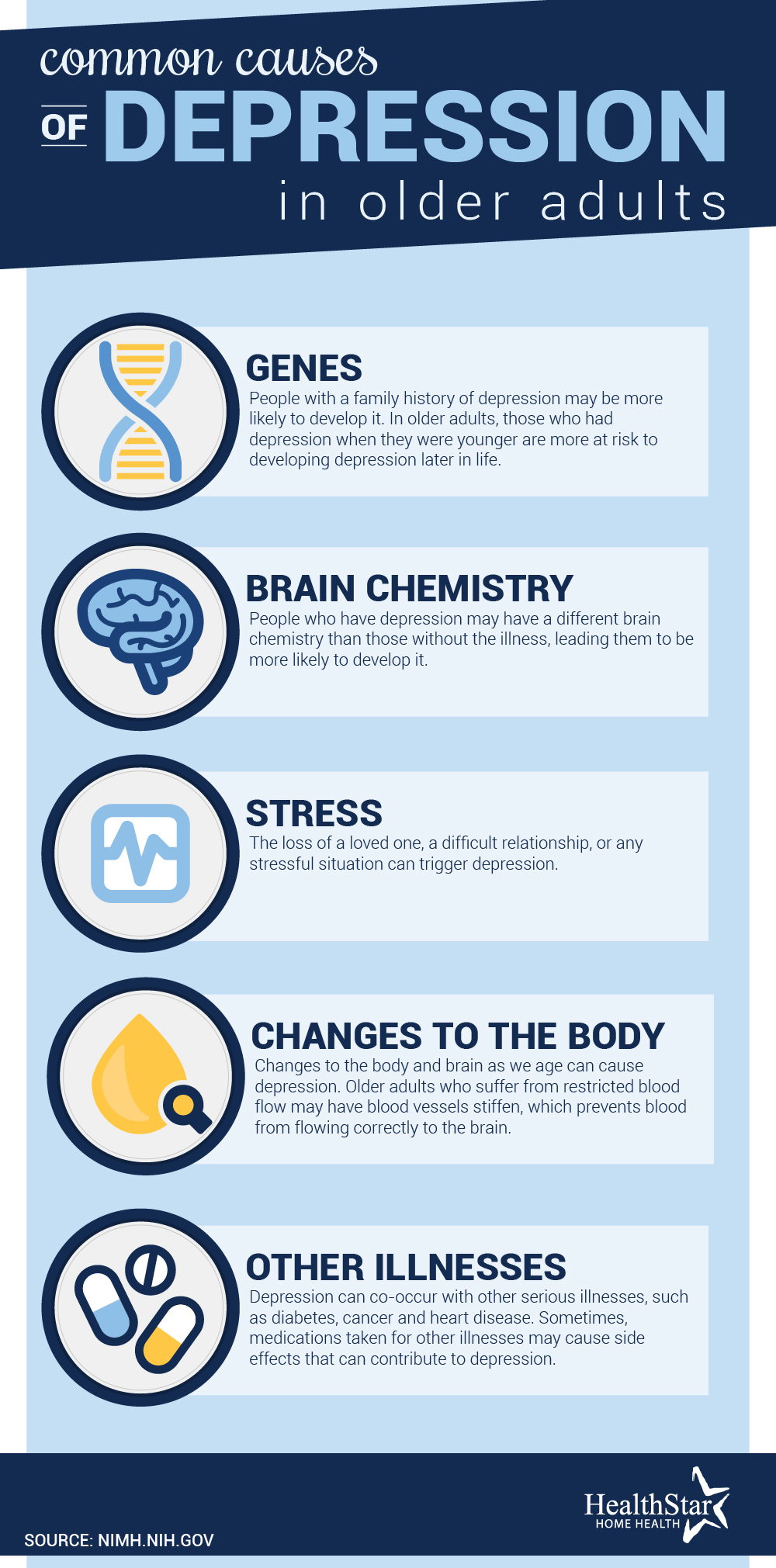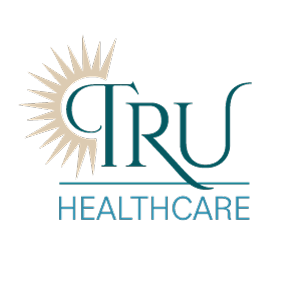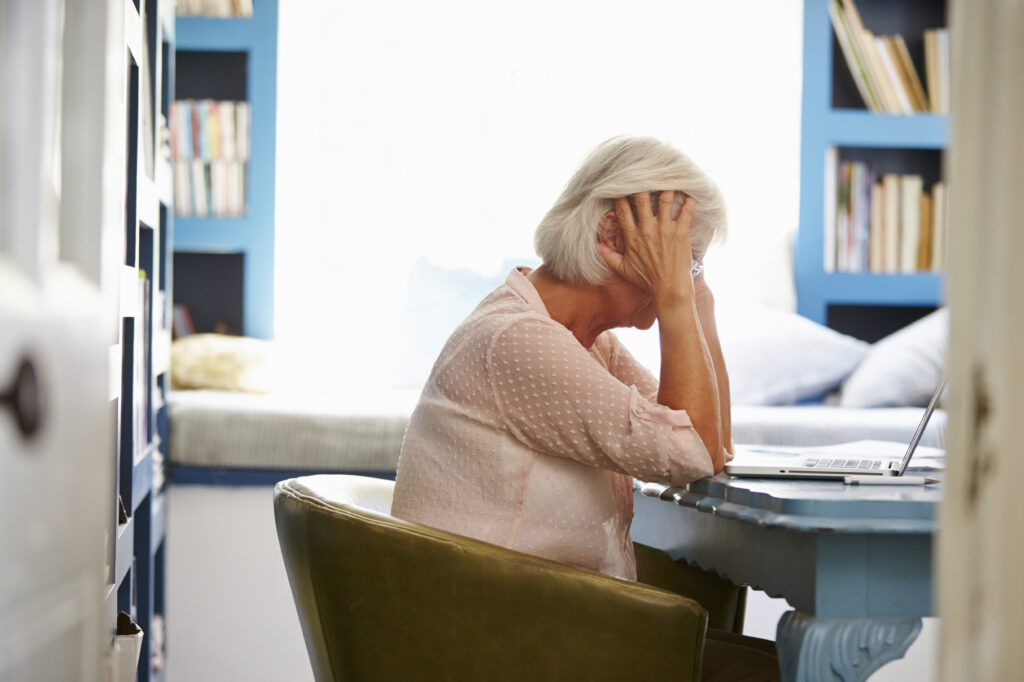Are you or an older adult you care for suffering from more than a case of the winter blues? Winters in Minnesota can have an effect on some as well as the lack of sunlight, but if you or a loved one are experiencing loss of appetite, low energy, feelings of hopelessness, amongst other symptoms, then you may be experiencing depression. You are not alone. The National Alliance on Mental Illness (NAMI) reports an estimated 16 million American adults had at least one major depressive episode last year. That is over 7% of the US population.
According to the Mayo Clinic website, depression is a mood disorder that causes a persistent feeling of sadness and loss of interest. Also known as major depressive disorder or clinical depression, it affects how you feel, think and behave and can lead to a variety of emotional and physical problems.

As a person ages, various life events such as the death of a loved one, retirement, or medical problems are experienced. It is common to be stressed or sad when managing these types of changes. When a person is suffering from depression, the feelings of stress and sadness do not go away after a normal adjustment period. The feelings are ongoing, worsen and interfere with daily life and normal functioning. As a branch of the U.S. Department of Health and Human Services, the National Institute of Mental Health (NIMH) is the lead federal agency for research on mental disorders. NIMH identifies 5 Common Causes of Depression in Older Adults:
- Genes – People with a family history of depression are more likely to develop it. In older adults, those who had depression when they were younger are more at risk to develop depression later in life.
- Brain Chemistry – People who have depression may have a different brain chemistry than those without the illness, leading them to be more likely to develop it.
- Stress – the loss of a loved one, a difficult relationship, or any stressful situation can trigger depression.
- Changes to the Body – Changes to the body and brain as we age can cause depression. Older adults who suffer from restricted blood flow may have blood vessels stiffen, which prevents blood from flowing correctly to the brain.
- Other Illnesses – Depression can co-occur with other serious illnesses such as diabetes, cancer and heart disease. Sometimes medications taken for other illnesses may cause side effects that can contribute to depression.
Since many people think the various signs of depression is a normal part of the aging process and a natural reaction to illness or social transition, depression often goes untreated in seniors. Medication and psychotherapy are common treatment options for depression, but there are other options as well. People over the age of 65 must be careful when taking medications. Oftentimes seniors may be more sensitive to medications or are taking various prescriptions for other health conditions when they add a medication for depression. This can lead to several issues, including forgetting to take a dose, overdosing and even a bad drug interaction.
Psychotherapy is also a very effective way of treating depression and other forms of mental illness. Often referred to as talk therapy, psychotherapy teaches a person new ways of thinking, behaving and helps to change habits that are contributing to the depression. Many seniors would prefer psychotherapy rather than add more medications to take each day and studies show that for older adults, psychotherapy is as effective as taking an antidepressant.
At HealthStar Home Health, we understand that mental health disorders begin in the early years – for many as young as childhood or early teenage years. We recognize the alarming statistics surrounding mental health conditions and offer Children’s Therapeutic Services and Supports (CTSS) for the adolescent age. Services through our CTSS program include, but are not limited to, specialized skills training, behavioral aid services and individual, family and group psychotherapy. For those suffering from depression or other form of mental illness in the adult years, HealthStar Home Health offers services through the Adult Rehabilitative Mental Health Services (ARMHS) program. The clients we support are struggling with disorders such as:
- Major depression
- Schizophrenia
- Bipolar disorder
- Agoraphobia
Becoming educated and helping to raise awareness of mental health conditions can break down obstacles and improve the recovery of millions of Americans who suffer from a mental disorder. If you’re concerned about a senior loved one showing signs of depression, don’t wait to get help. HealthStar Home Health offers support to families dealing with mental health disorders, whether it is an adult in the family, a senior loved one you are caring for, or children and teenagers, we have a program to help you.
Spending quality time with family, friends and being active in your Minneapolis, Minnesota community will help you stay healthy, but sometimes you may need a little more support. Contact HealthStar Home Health directly by calling 651-293-1000 and ask to speak to a professional in the Adult Rehabilitative Mental Health Services (ARMHS) department or the Children’s Therapeutic Services and Supports (CTSS) department.

